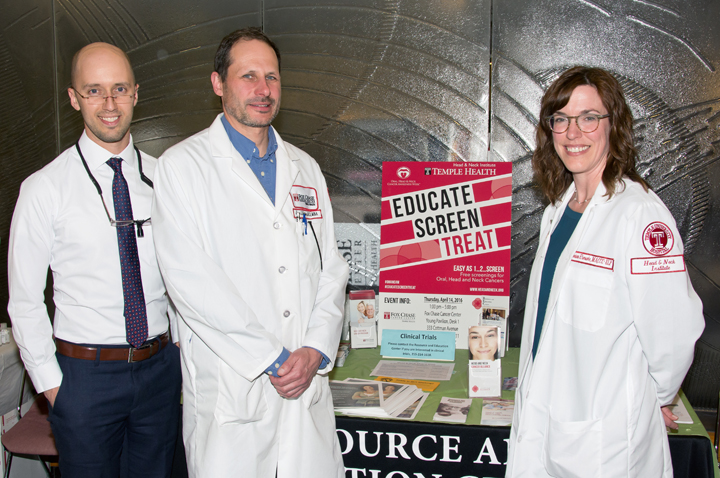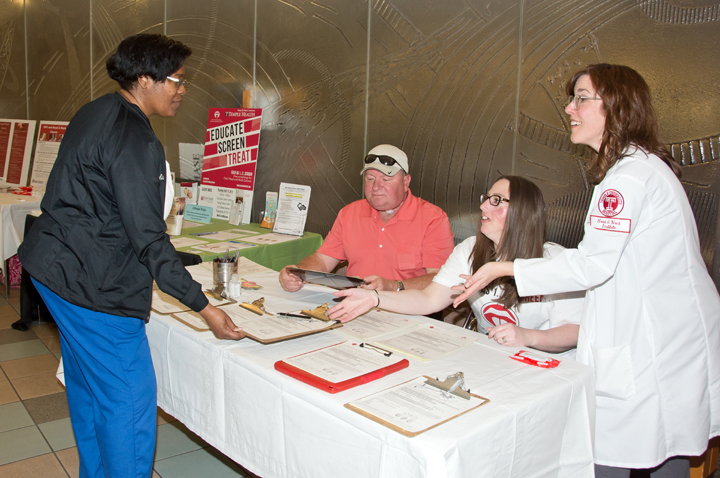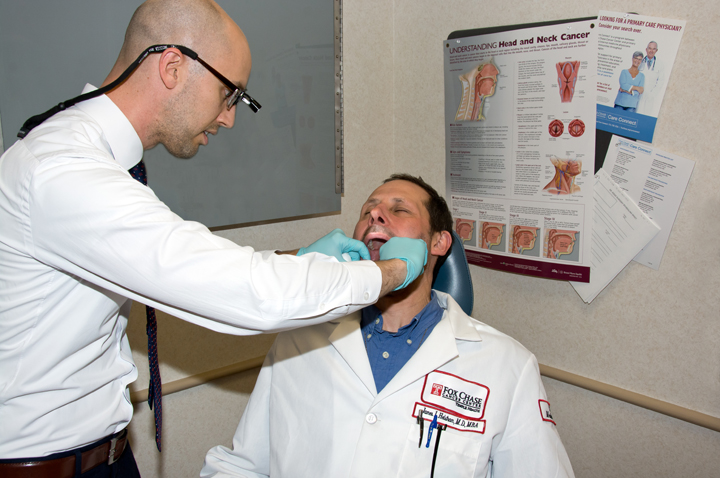
Oral, Head, and Neck Cancer Screening a Success
-

Pictured, from left: Ophelia Harling, employee, Scott Parker, patient, Courtney Maldonado, patient, Barbara Ebersole, Assistant Director of the Temple Health/Fox Chase Head & Neck Institute Specialists from Fox Chase Cancer Center and the Temple Head & Neck Institute performed cancer screens on nearly 300 people from April 12-15, 2016 in observance of Oral, Head and Neck Cancer Awareness Week. The screening was organized by Barbara Ebersole, BFA, MA, CCC-SLP, Assistant Director of the Temple Health/Fox Chase Head & Neck Institute.
The free cancer screenings were conducted at Jeanes Hospital, Temple Health Ft. Washington, Fox Chase Cancer Center and Temple University Hospital. Of the 297 people screened, 39 were referred to various specialists in the health system for further evaluation.
The 297 people screened represent a 70 percent increase from the number of people screened at last year’s event. Of the people screened, 205 were Temple Health employees, and 92 were non-employees.
When it comes to recognizing the symptoms of head and neck cancer and getting screened, education is key, said Christopher Fundakowski, MD, a surgical oncologist in the division of head and neck surgery at Fox Chase.

Dr. Fundakowski performs a screening on his colleague, Dr. Helstrom. “Terrible things can manifest as common problems. Knowing when something doesn’t go away and where to have it checked out can make the difference of being cured of a terrible cancer,” said Fundakowski, who performed a screening on his colleague, James Helstrom, MD, MBA, Chief Medical Officer of Fox Chase.
Historically, people who smoked and drank alcohol were the at-risk group but due to the rise of HPV-related head and neck cancers, everyone should be checked out, especially if they’re experiencing symptoms like lumps that last for more than a couple weeks, having difficulty swallowing, or anything out of the ordinary, Fundakowski said.
Though the screenings last around five minutes and are painless, some people needed convincing to stop, which is where volunteers – and head and neck cancer survivors – Scott Parker and Courtney Maldonado came in. Volunteering at the screening at Fox Chase, Scott and Courtney manned the registration table and recruited people to stop for the screening.
Scott was first diagnosed with laryngeal cancer in 2009 and had a laryngectomy three years later. After his battle with cancer, he encourages everyone to get screened.

Christopher Fundakowski, James Helstrom and Barbara Ebersole “A lot of people are apprehensive. So was I. A quick visit can spot a problem,” said Scott. “If someone can avoid going through this with an easy check, then that’s great.”
For Courtney, the headaches she was experiencing combined with an issue with her tooth led to the discovery of a tumor growing in her maxillary sinus in 2013. Like Scott, she suggests people to keep an eye on any changes they notice and take action sooner rather than later.
“People ignore symptoms because they have work and kids and you kind of push through it. You ignore simple symptoms that will get you an early detection,” said Courtney.
